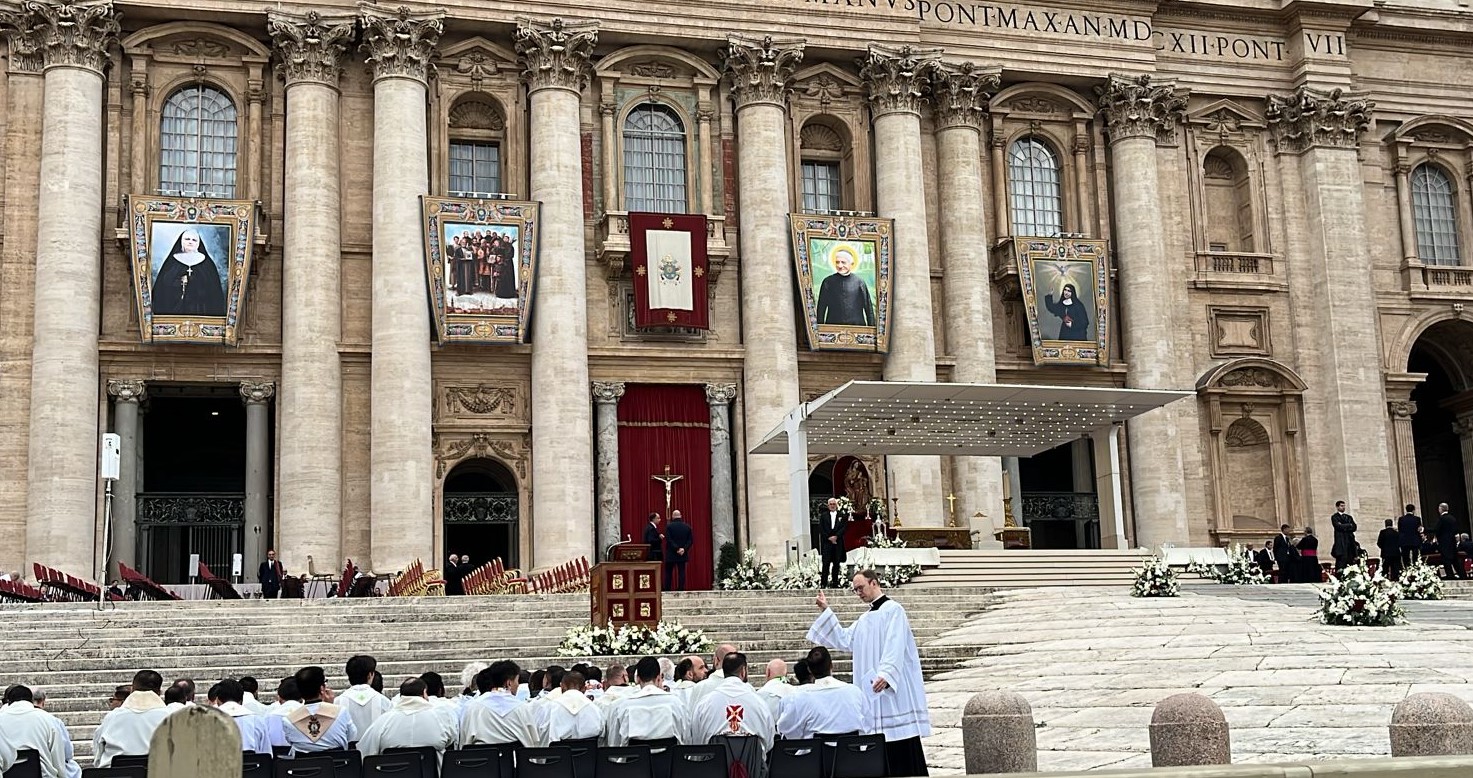
October 20, 2024: Pope Francis Proclaims 14 New Saints
In a St. Peter’s Square packed with faithful, the Holy Father proclaimed Saints Manuel Ruiz López and seven Companions and Francis, Mooti and Raffaele Massabki, Giuseppe Allamano, Marie-Léonie Paradis and Elena Guerra
Pope Francis on Sunday 20 October presided over the Mass of canonization of eleven martyrs of Damascus, martyred in 1860: Manuel Ruiz López and seven Companions and Francis, Mooti and Raffaele Massabki, Maronite lay faithful. The presbyter Giuseppe Allamano, founder of the Consolata Missionaries, Marie-Léonie Paradis, founder of the Little Sisters of the Holy Family, and Elena Guerra, founder of the Oblates of the Holy Spirit, Apostle of the Holy Spirit.
The homily
In the homily, the Pope commented on the Gospel passage in which Jesus asks uncomfortable questions to James and John who, in their hearts, claim to have a place of honor alongside a victorious and glorious Messiah, imagining him “second a logic of power”. Even in the Church comes this thought and this search: honor, power… Not so Jesus. He is not the Messiah that they think; he is the God of love, who humbles himself, who becomes weak to raise up the weak, who works for peace and not for war, who came to serve and not to be served.
The cup that the Lord will drink is the offering of his life, given to us out of love, until death and death on the cross. To the right and left of Jesus on the cross are two thieves “nailed with Christ in pain and not seated in glory”.
“It is not the one who dominates who wins, but the one who serves out of love”, the Pope underlined again. Jesus, “makes himself last so that men can be raised up and become first”. Jesus helps the disciples to convert and change their mentality, to think not according to the logic of the world but according to the style of God which is service. It is necessary to adopt God’s style, made of service, love, closeness, compassion and tenderness, far from the logic of power and fame.
Witnesses of the Gospel
The new saints, “disciples of the Gospel” as the Pope defined them, lived the style of Jesus: service. The faith and apostolate they carried out did not fuel worldly desires and lust for power in them but, on the contrary, they became servants of their brothers, creative in doing good, steadfast in difficulties, generous and joyful even to the point of martyrdom .
“He who serves with love – said the Pope – does not say: ‘now it will be someone else’s turn’”. Service is the fruit of a new heart. This is a thought for employees, not for witnesses. Service is born from love and love knows no boundaries, it does not make calculations, it is spent and given. It is not limited to producing to bring results, it is not an occasional performance, but it is something that comes from the heart, a heart renewed by love and in love.

The apostolate of Santa Elena Guerra
While Pope Francis was giving these teachings, it was not difficult to think of the “Service” provided by Elena in various fields, starting from when she went to Porcari to help those affected by cholera.
In the city he went to visit the sick in their homes. With humility and self-denial he became a beggar, from door to door, to raise funds for the maintenance of the missionaries and support for their works. He also expressed his service in the field of education and catechesis, establishing a school. Humble servants, following the example of Santa Zita, he wanted his nuns. He also lived in the spirit of “service” the composition of numerous booklets to promote “devotion” to the Holy Spirit.
As Fr. Igino Tubado notes, “Service” is the fruit of “profound spiritual maturity”, a maturity that John Paul II attributed to the Holy Spirit. The Gifts of the Holy Spirit lead man to do well. “The love of God – wrote Saint Helena – does not want philosophy, it wants simplicity, a broad and generous heart”. The virtues of the heart, Elena explained, are “meekness, humility and charity, which manifest themselves in sweet goodness.
This sweet goodness is expressed externally in sweet speaking, sweet listening, sweet looking, sweet commanding, sweet greetings: in short, sweet coexistence. Internally the sweet goodness consists of amaretto. But to love, we must esteem and esteem what God esteems.” All this spiritual work within us is the work of the Holy Spirit.
It is the Holy Spirit, who transforms hearts of stone into hearts of flesh, capable of sweetness, tenderness, closeness and compassion. The Holy Spirit is Love, and love cannot help but love. The canonization of Blessed Elena Guerra leads us to rediscover the Holy Spirit, and invoke him, always, continuously, so that he directs thoughts, words and works according to the will of God, and that service is only Love.
After the canonization it is necessary to continue to deepen the teachings of Saint Elena Guerra and keep in our hearts the three words that Pope Francis gave us: closeness, compassion, tenderness, reading them in the life of the Apostle of the Holy Spirit, because every work that we are called to realize it is just, simply, love.
